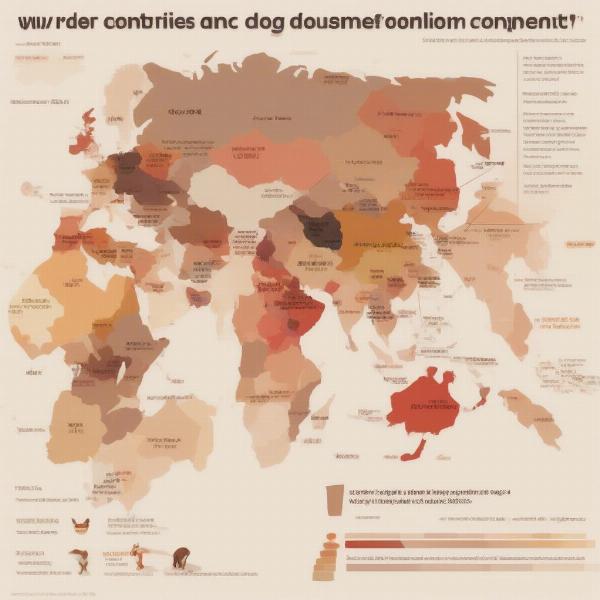The term “the dog butcher” can evoke a range of reactions, from curiosity to concern. While it might sound alarming, it’s crucial to understand the various contexts in which this phrase is used. This article will explore the different meanings of “the dog butcher,” addressing common misconceptions and providing clarity for dog owners. We’ll delve into the potential association with dog meat consumption in certain cultures, discuss the term’s use in reference to poor grooming practices, and explore its metaphorical application to aggressive dog trainers or handlers.
Understanding the Cultural Context of “The Dog Butcher”
In some cultures, the term “dog butcher” refers literally to someone who slaughters dogs for meat. This practice, while controversial in many parts of the world, is a reality in certain regions. It’s essential to approach this topic with cultural sensitivity and understand the historical and societal factors that influence these practices. While respecting cultural differences, it’s also important to advocate for humane treatment of all animals.
 Dog Meat Consumption in Different Cultures
Dog Meat Consumption in Different Cultures
“The Dog Butcher” and Bad Grooming Practices
Sometimes, the term “dog butcher” is used to describe a groomer who performs a particularly bad haircut. A poorly executed grooming session can leave a dog looking drastically different, sometimes comically so. While this usage of the term isn’t literal, it highlights the importance of choosing a qualified and experienced groomer who understands different breeds’ specific grooming needs.
“The Dog Butcher” as a Metaphor for Harsh Training Methods
The term “dog butcher” can also be applied metaphorically to dog trainers or handlers who employ aggressive or abusive methods. These individuals prioritize dominance and intimidation over positive reinforcement and understanding canine behavior. Such practices can be detrimental to a dog’s physical and emotional well-being, leading to fear, anxiety, and aggression.
Choosing a Qualified Dog Groomer or Trainer
Whether you’re looking for a groomer or a trainer, it’s essential to do your research. Look for certified professionals with a proven track record of success and positive client testimonials. Observe their interactions with dogs and ask about their training philosophies. A good groomer or trainer will prioritize your dog’s well-being and use methods that build trust and respect. Avoid anyone who uses fear, intimidation, or physical punishment.
Conclusion
“The Dog Butcher” can have multiple interpretations, from a literal profession in certain cultures to a metaphorical description of poor grooming or training practices. Understanding these different contexts is crucial for responsible dog ownership. By being informed and choosing qualified professionals, we can ensure the humane and ethical treatment of our canine companions. Remember to always prioritize your dog’s physical and emotional well-being.
FAQ
- Is it legal to consume dog meat? The legality of dog meat consumption varies significantly around the world. It’s legal in some countries and regions, while strictly prohibited in others.
- How can I find a reputable dog groomer? Ask for recommendations from your veterinarian, friends, or local dog owners. Check online reviews and look for groomers with relevant certifications.
- What are some signs of a bad dog trainer? Avoid trainers who use punishment-based methods, promote dominance theory, or exhibit a lack of patience and understanding towards dogs.
- What are the benefits of positive reinforcement training? Positive reinforcement builds a strong bond between dog and owner, fosters trust, and promotes learning through encouragement rather than fear.
- How can I report animal cruelty? Contact your local animal control agency, humane society, or law enforcement if you suspect animal abuse.
- What should I do if my dog has been poorly groomed? Communicate your concerns with the groomer and consider filing a complaint with the business if necessary.
- Are there any specific breeds that require specialized grooming? Yes, many breeds, such as Poodles, Bichon Frises, and Cocker Spaniels, have specific grooming needs that require professional expertise.
Related Articles on ILM Dog
ILM Dog is a leading international website dedicated to providing dog owners worldwide with reliable and practical advice on all aspects of dog care and wellbeing. From breed selection and health care to training, nutrition, grooming, and exercise, we offer expert guidance to help you provide the best possible care for your furry friend. Our articles cover a wide range of topics, catering to both new and experienced dog owners. Contact us for more information at [email protected] or +44 20-3965-8624. ILM Dog is committed to helping you build a strong and loving relationship with your dog.